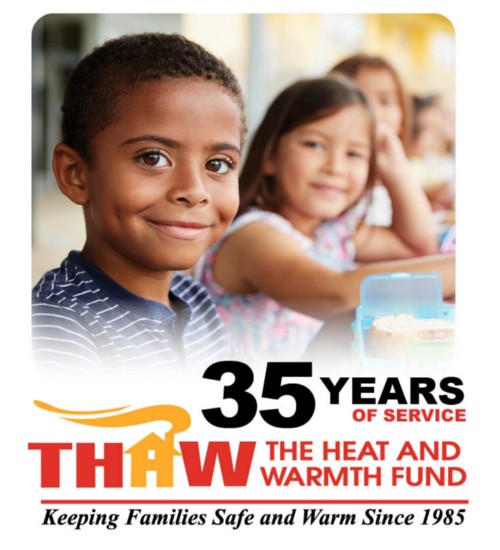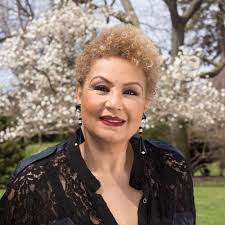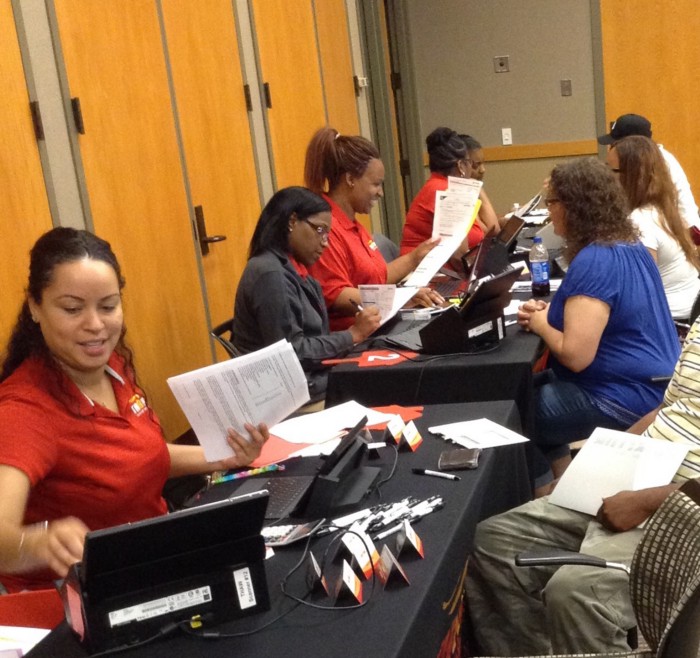
News & Events
CEO LETTER: Celebrating 35 Years of Service

Dear Friend,
At THAW, our mission is to stabilize and empower Michigan families, keeping them healthy, safe, and warm.
Five years ago, when I started at THAW, we were approaching our 30th Anniversary. I walked into an organization that had just launched its new Utility Assistance Center (UAC) one month prior to my start date. The UAC is responsible for receiving all calls related to utility assistance (some days over 3,000 calls), processing more than 20,000 applications annually and assisting walk-in customers seeking assistance (up to 120 per day). My top priorities included creating a customer-focused environment; simultaneously increasing efficiencies and resources to serve more people and expanding our service model.
For the previous 30 years, THAW had been, and continues to be a leader in providing energy assistance. I believe we do this better than any organization. Providing families with access to utilities continues to be a focus of our mission because we know living without heat, electricity, or water can have devastating short-term and long-term impacts on families. Although we understood this, we had not focused on other areas of impact. So, we decided to take a more holistic view and approach to assistance— one that would not only address the immediate need for utility assistance, but also seek to address other household issues that make it more difficult to maintain access to utilities and/or areas that are more seriously impacted by lack of heat, electricity, or water. We were looking for barriers to self-sufficiency and ways to knock them down.
In the last five years, THAW launched our first water assistance and conservation program. This program saved families an average of $150 a year on their water bills and over 2 million gallons of water in the first year. We launched a case management program to work directly with families experiencing more significant obstacles such as housing or medical issues.
We also launched the IHEAL program, which focused on improving health with energy assistance for low-income families. Working with St. John Providence (now Ascension) and Mercy Health Clinic, we created a program that specifically targeted people with health conditions that were complicated by extreme temperatures or lack of utilities, such as CPOD, asthma and certain heart conditions. We even had a case manager onsite weekly at a federally qualified health clinic serving vulnerable populations.
We strengthened our partnership with many schools and the Michigan Department of Health and Human Services (MDHHS) through the Pathways to PotentialProgram which enabled THAW to have utility assistance specialists onsite in schools and MDHHS offices.
In 2018, we adopted a five-year strategic plan. Plan highlights include diversifying services to address client needs better and providing more data and research to inform policies impacting the people we serve.
As I reflect on the past five years and our accomplishments for which I am so proud, I cannot help but reflect on the past five months and the uncertainly that has made us all feel so vulnerable. COVID-19 has forced us to rethink everything from the way we buy groceries to the way we express affection to our loved ones, and even the way we do business. Only time will tell what life will look like aft er the pandemic. But one thing time has taught us repeatedly is that together we can conquer the toughest battles, even when we must do it while staying apart.
THAW has been serving and supporting vulnerable Michigan families for 35 years! I am grateful to have been the leader the last five years. I am humbled and honored to do this work. When people ask, “What do you do?” I often respond, “I keep babies warm.” I proudly exclaim, “I provide light for school children to study,” or, “I provide water for seniors to bathe and take medication.” THAW is fueled by a desire to do even more over the next five years to meet the needs of families, including a focus on workforce development and job training through our utility assistance center. As always, Team THAW will continue being advocates and champions for the people we serve.
I thank you for your support and contributions over the past 35 years. I look forward to the next 35 years with THAW stabilizing Michigan families, keeping them healthy, safe and warm.
Be healthy. Be safe.
In service,
Saunteel Jenkins
Chief Executive Officer
The Heat and Warmth Fund
Community Leader Dr. Geneva Williams Reflects on THAW’s Early Days
Dr. Geneva Williams was one of the brains behind THAW’s founding in Detroit 35 years ago. She shared her early memories of the organization for this anniversary edition of the newsletter. Dr. Williams, who has deep Detroit ties, has been an Executive, CEO, School Superintendent, and led the start and merger of many nonprofit organizations. Today she is an impact leadership expert, certified life coach, podcaster, author and speaker who helps successful women over 50 create “next step” game plans for living a vibrant life full of meaning, passion, impact, fun, and joy.
THAW: How was THAW founded?
Williams: In the early ’80s, I was the vice president of planning at United Community Services, now United Way for Southeastern Michigan. I was the first Black person and the first woman to achieve officer status within United Way for Southeastern Michigan. I remember one of my staff members and I worked on a report called “The Energy Coalition,” which examined energy, energy needs, and what was happening in the tri-county area in terms of disadvantages.
We discovered that the number one reason people called for help was utility relief. People were struggling with their bills. It was such a significant finding that my team agreed that a solution was needed. From that realization, THAW was born.
There was a strong desire fueled by Detroiters and other stakeholders to figure out what people needed. Then began a conversation primarily with utility companies, including Detroit Edison, MichCon, and Consumers Power.
Collectively, with United Way for Southeastern Michigan, we decided to create a fund to support people with energy needs, particularly during critical months. In the beginning, operations were lodged at United Community Services. I supervised the project, hired the first director, and was intimately involved in all planning activities.
THAW: As an Honorary Founding Board Member of THAW, what was your initial vision for the organization?
Williams: Our initial vision for the organization was to address the need. With the strong leadership that Saunteel provides, we’ll continue to see THAW be relevant and responsive.
THAW: What do you believe is the most profound impact THAW has had on Michigan residents?
Williams: In reflecting over the last 35 years all the phenomenal work THAW has done, I am moved by its origins. We met tons of folks who needed this kind of help from the beginning. Being able to directly and specifically address people’s needs when they called for help, well, it doesn’t get better than that.
THAW is a remarkable symbol of what can happen when people come together to do good. If the purpose is right, if the need is there, and you have the right people around the table, it will last. The impact will last.
THAW: How can THAW be a bridge toward economic sustainability to support Michigan’s vulnerable residents?
Williams: Saunteel and the staff at THAW intimately understand that it’s not just about one isolated issue or need that people have. If you’re having difficulty keeping your lights on, you’re likely also having problems with employment, and in managing and keeping things together. A utility bill that you don’t have money for is just the beginning.
It’s critical to help people and work with people to move from point A to point B. But it’s also essential to recognize the social detriments at play and how a holistic approach makes a difference.
THAW: What do you believe is the most profound impact THAW has had on Michigan residents?
Williams: All my career, I’ve worked with people to make good things happen. In neighborhoods, with young people, the underemployed and unemployed. There isn’t a social issue that I probably haven’t been involved in trying to address. But, I’m especially grateful to have been able to help make good things happen with THAW.
One of the mantras that fueled my work when THAW was founded and continues to fuel my work is an African Proverb that says, “When spiderwebs unite, they can tie up a lion.” Simply put, when people come together, they can tackle anything.
I am proud of the way THAW continues to tackle the issues. I look forward to its continued work.
Just as Dr. Williams mentions customers calling for utility relief support in the early 80s, 35 years later, it continues to be one of the number one reasons families seek assistance. THAW’s work was relevant then and is still relevant today. You can help THAW continue its mission by donating, advocating for vulnerable populations, and sharing information about our programs.

Amanda THAW Front Line Energy Program - 24 seconds
Front Line Energy Workers Receive Unprecedented Support from THAW
Amanda Damian’s startup grocery delivery business, Canton Care Partners, made a big shift in March.
The COVID-19 pandemic created a niche in the community and Canton Care Partners jumped into action to fill that niche. Amanda’s husband lost his job and as the sudden sole breadwinner, she found her family in immediate need. She heard about THAW’s Front Line Energy Program, applied, and was awarded utility assistance funding.
The Front Line Energy Program launched on April 22 with nearly a half million dollars committed to supporting essential workers by paying electric, gas, and water bills. Many families like Amanda’s are what is referred to as the ALICE (Asset Limited Income Constrained Employed) population. ALICE families earn enough to disqualify them for most traditional assistance programs but not enough to meet their basic needs.
More than 1.5 million households, 40% of Michigan’s population, cannot afford basic household necessities and are left choosing between paying rent, health care costs, groceries, child-care and transportation.
At the beginning of the shelter-in-place order, Amanda arrived at grocery stores as early as 7:30am. This oft en meant standing in long lines until the doors opened. She consistently changed gloves, sanitized her hands, wiped down her car in between deliveries, and then went home to completely disinfect.
“After going to five grocery stores where lines could be 20 people long, I was exhausted,” said Amanda.
“But, the most challenging aspect has been getting up to shop for other people while consciously exposing myself to germs, and potentially the virus.”
She’s done everything she can to keep herself and her family healthy, including helping her seven-year-old, who has severe anxiety, understand all the precautions she takes when she leaves the house and when she returns.
Most of her customers are seniors who are not only unable to leave the house but are sometimes also unable to articulate their needs.
Amanda often works with the adult children of seniors, even those out of state, to understand how to best support their parents.
“I’ve always had a sweet spot for the elderly, some of the most vulnerable in our communities. Even if they have the funds, they don’t always have family close by to help them meet their needs,” said Amanda.
Her business transformed and she began delivering cleaning supplies, medicine, books, clothing and even making post office and bank runs for customers. After dropping off groceries, she even drove a customer to chemotherapy.
THAW helped 1,233 households pay their utility bills with the funds allocated for the Front Line Energy Program. The funding is currently exhausted; however, THAW is still raising funds to help other essential workers like Amanda. Our work is not done.
Thank you to the donors who made gifts to support this special fund. Visit https://thawfund.org/2020-frontline-energyprogram/ to learn more about the program and to donate today.
Reflections from the THAW Team
THAW is like “the little engine that could.” Our team consists of people who find a way to get it done, and don’t take no for an answer when it comes to empowering and servicing our clients.”
Saunteel Jenkins, CEO
Thirty-five years of serving. 35 years of restoring. 35 years of filling the gaps. 35 years of meeting needs. 35 years is worth celebrating. None of this would be possible without the generous support from thousands of donors and a team dedicated to moving the mission forward.
Here are five reflections from THAW team members that exemplify how service is delivered and how the customers give back as much as they get.
- “A woman came into THAW one winter for help. Her family had fallen on hard times, her utilities were disconnected, and it was so cold that she and her family had to leave their home. Someone from her church paid for the family to stay in a hotel for a few nights. She qualified for assistance and I placed a call to have her services restored. When I explained to the client that her services should be restored by the time she got home, she started crying, expressing her gratitude, not knowing where the family was even going to sleep that night. I responded, “you get to go home”. She hugged me so tight, and when I remember this, I still see her face.”
- “At a Community Assistance Day event a man and his wife explained that the man was terminally ill with cancer. He was rearing several grandchildren on his own and wanted to ensure their safety before he died. With medical bills and treatments, they didn’t have enough money for other household bills, including utilities. He qualified for utility assistance and his utility bills were brought current. The man stated that we had just removed a heavy weight from his shoulders, and you could see it in his face. He asked if he could hug me and I asked if we could pray.”
- “I recall a client with broken windows in the home during the winter. We worked with the Helping Neighbors program and went above and beyond to find someone to replace the windows.”
- “I remember running into a customer in the lobby. She repeatedly provided assurance that she had all the paperwork because she really needed help. I didn’t rush her. I listened to her stories about her family and health challenges. I processed her application and she told me that I had answered her prayers. She gave me a necklace of protection to thank me.”
- “The officer had been shot over a dozen times and spent nearly two years hospitalized. While he was hospitalized, his wife was diagnosed with cancer and died. The had three little girls and over $12,000 in utility bills. With the help of some of our partners, we assisted the officer to make sure he and his little girls had utilities.”

